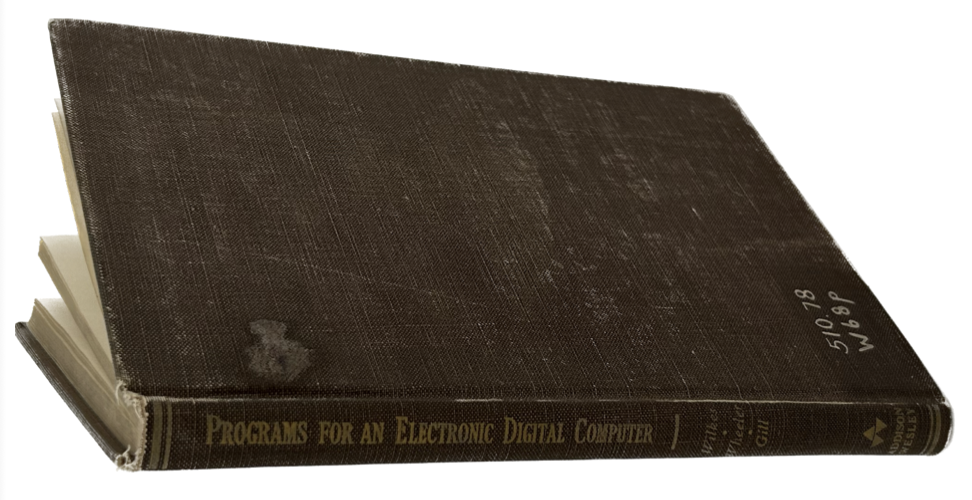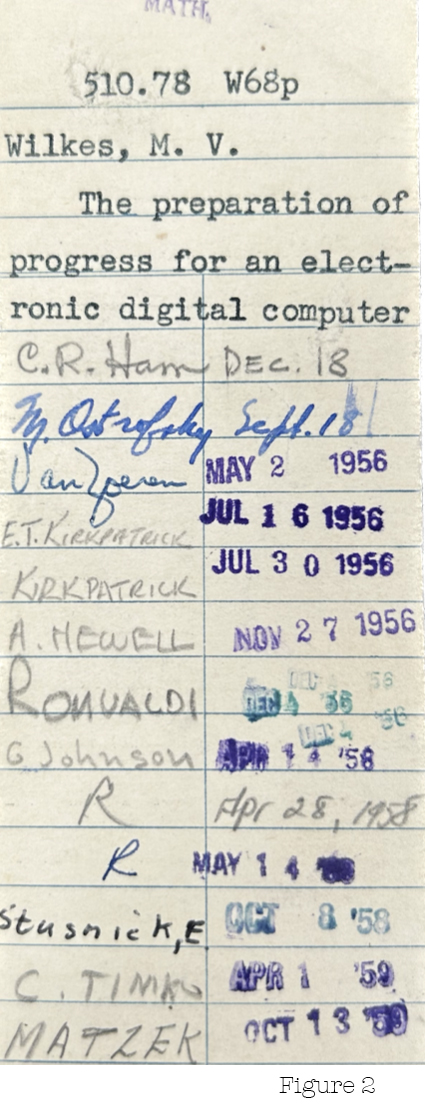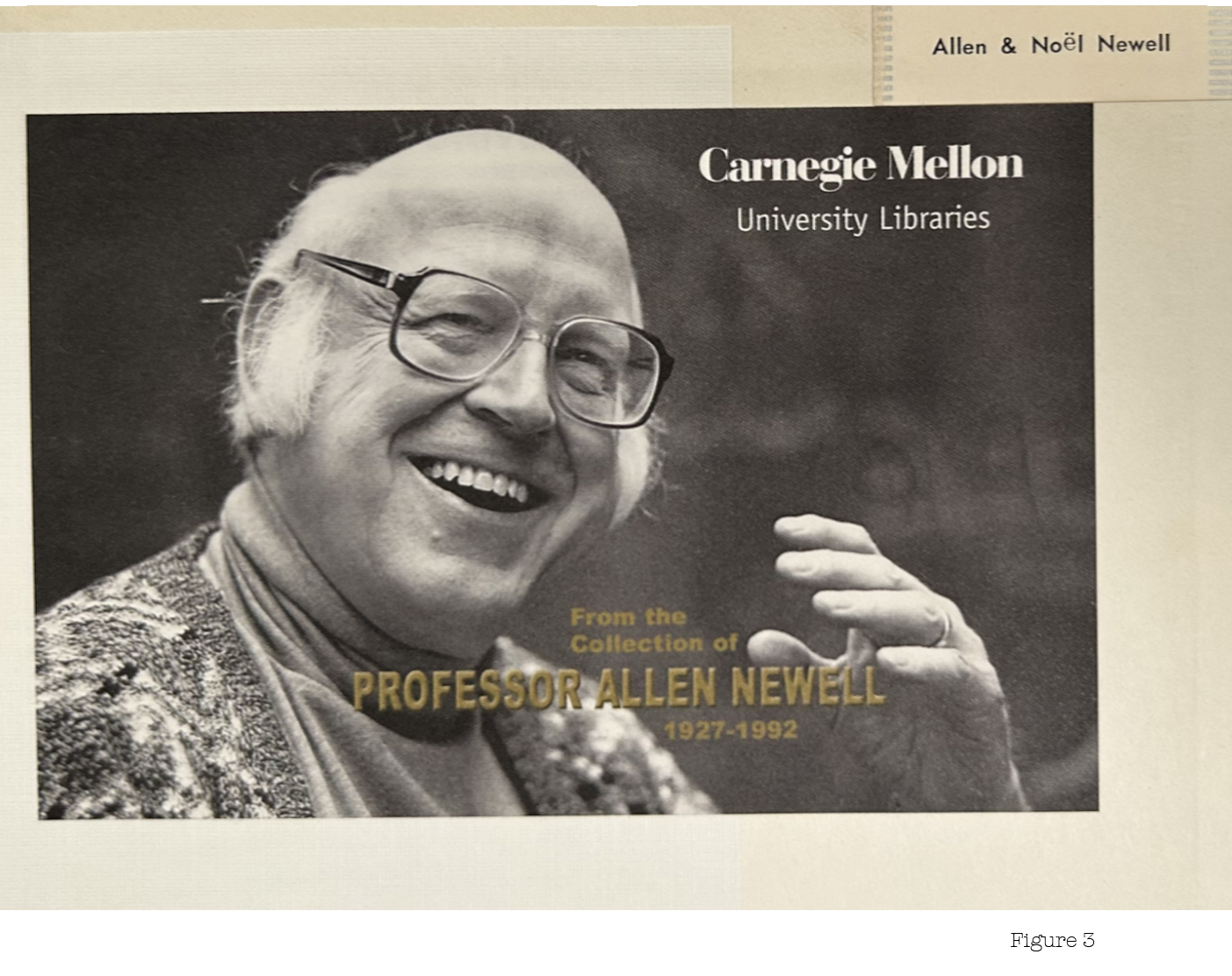
Several recent posts to this blog have described an ongoing project to identify circulating copies of rare and important works in the history of computing in CMU Libraries' and to transfer these works to Special Collections, the University’s repository for rare books, manuscripts, and early calculating devices and cryptographic machines.
One book recently relocated to Special Collections from the Libraries’ off-site facility is The Preparation of Programs for an Electronic Digital Computer by Maurice Wilkes, David Wheeler, and Stanley Gill (figure 1). The Libraries’ copy is a first edition, published in 1951 in Cambridge Massachusetts at the Addison-Wesley Press. Though not particularly rare (OCLC records some 135 copies in libraries in the United States), Wilkes’ Preparation is considered the first printed book on computer programming and is therefore an important artifact from the early history of computer science. While Wilkes et al.’s definition of what constitutes a computer program — “groups of symbols punched on a paper tape or prepared in some other form which can be fed into a machine” — now seems antiquated, the book’s influence is difficult to overstate (1). It was once referred to in shorthand as Wilkes, Wheeler, and Gill, reflecting its status as an indispensable handbook on programming subroutines for stored-program computers.
Figure 1. CMU Libraries’ copy of the first edition of "The Preparation of Programs for an Electronic Digital Computer" (Cambridge, 1951), the first printed book on computer programming.
 Unsurprisingly, the book was read and studied by leading figures in the history of computing, including CMU’s own Allen Newell. In fact, CMU’s copy of the first edition retains a stamped borrowing slip that lists Allen Newell among its earliest readers. Newell borrowed the book late in 1956, returning it sometime before November 27 of that year (see Figure 2).
Unsurprisingly, the book was read and studied by leading figures in the history of computing, including CMU’s own Allen Newell. In fact, CMU’s copy of the first edition retains a stamped borrowing slip that lists Allen Newell among its earliest readers. Newell borrowed the book late in 1956, returning it sometime before November 27 of that year (see Figure 2).
Newell’s name on the circulation slip of our copy represents a fascinating piece of history. 1954-1959 was a period of radical inventiveness in Newell’s career; it was during this period that Newell first became interested in artificial intelligence. In 1955, for instance, Newell began work (with Herbert A. Simon and Cliff Shaw) on the Logic Theorist, the first computer program capable of automated reasoning and the origin of programmed artificial intelligence.[1] As Simon famously quipped in January, 1956, “Over Christmas, Al Newell and I invented a thinking machine.” During this period, Newell, Simon, and Shaw also developed the Information Processing Language (IPL) and the General Problem Solver (GPS), a computer program that operated on the basis of Means-Ends Analysis (MEA).
Figure 2. Circulation slip showing Allen Newell’s name among the book’s early borrowers.
Also transferred to Special Collections this week is CMU Libraries’ copy of the second edition of Wilkes, Wheeler, and Gill, printed in 1957. Evidently, Newell’s encounter with CMU’s copy of the first edition was generative, as this copy of the second edition was once in Newell’s own library (see figure 3). It came to CMU Libraries as part of the bequest of Newell’s books after his death in 1992; sadly, the book is characteristically devoid of annotation — Newell did not mark his books, and so we are left without evidence of how (or even if) he read his copy of the second edition.
[1] See Pamela McCorduck. Machines Who Think. A K Peters / CRC Press, 2004, 123-125.

Figure 3. Allen and Noël Newell’s bookplate in the Libraries’ copy of the second edition of "The Preparation of Programs for an Electronic Digital Computer" (Cambridge, 1957)
Wilkes (1913-2010; Turing Award 1967) was an English computer scientist and pioneer of stored-program computing. After attending John von Neumann’s Moore School Lectures at the University of Pennsylvania in the summer of 1946, Wilkes returned to England to lead the development of the EDSAC (Electronic Delay Storage Automatic Calculator), the world’s second operational stored program computer (after the Manchester Baby), the design of which was based on the privately-circulated draft of John von Neumann’s report on the EDVAC (Electronic Discrete Variable Automatic Computer).
The project to transfer rare works on computing to Special Collections continues and has so far led to the relocation of some 150 titles, including works by Grace Hopper, Alan Turing, Claude Shannon, and Alonso Church. All of these books — and more! — are available for research and instruction by appointment in Special Collections on the fourth floor of Hunt Library.
by Sam Lemley, Curator of Special Collections
